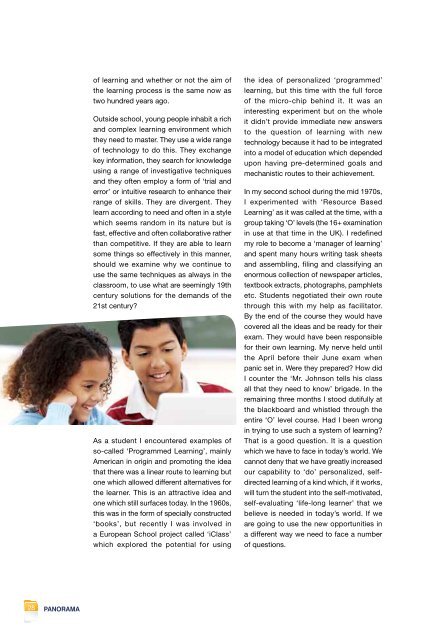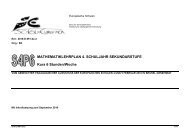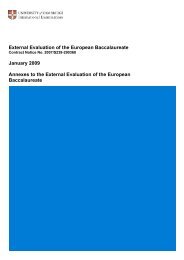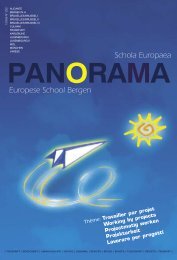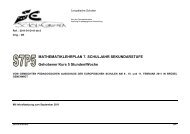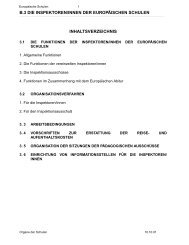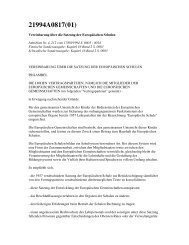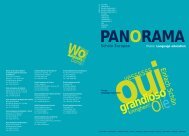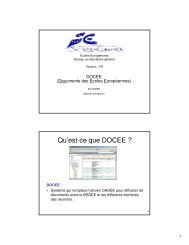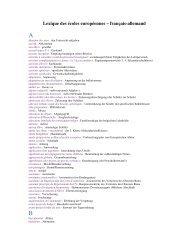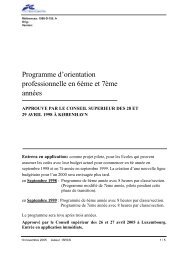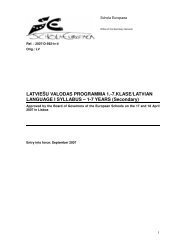Schola Europaea European School Brussels II
Schola Europaea European School Brussels II
Schola Europaea European School Brussels II
Create successful ePaper yourself
Turn your PDF publications into a flip-book with our unique Google optimized e-Paper software.
28<br />
PANORAMA<br />
of learning and whether or not the aim of<br />
the learning process is the same now as<br />
two hundred years ago.<br />
Outside school, young people inhabit a rich<br />
and complex learning environment which<br />
they need to master. They use a wide range<br />
of technology to do this. They exchange<br />
key information, they search for knowledge<br />
using a range of investigative techniques<br />
and they often employ a form of ‘trial and<br />
error’ or intuitive research to enhance their<br />
range of skills. They are divergent. They<br />
learn according to need and often in a style<br />
which seems random in its nature but is<br />
fast, effective and often collaborative rather<br />
than competitive. If they are able to learn<br />
some things so effectively in this manner,<br />
should we examine why we continue to<br />
use the same techniques as always in the<br />
classroom, to use what are seemingly 19th<br />
century solutions for the demands of the<br />
21st century?<br />
As a student I encountered examples of<br />
so-called ‘Programmed Learning’, mainly<br />
American in origin and promoting the idea<br />
that there was a linear route to learning but<br />
one which allowed different alternatives for<br />
the learner. This is an attractive idea and<br />
one which still surfaces today. In the 1960s,<br />
this was in the form of specially constructed<br />
‘books’, but recently I was involved in<br />
a <strong>European</strong> <strong>School</strong> project called ‘iClass’<br />
which explored the potential for using<br />
the idea of personalized ‘programmed’<br />
learning, but this time with the full force<br />
of the micro-chip behind it. It was an<br />
interesting experiment but on the whole<br />
it didn’t provide immediate new answers<br />
to the question of learning with new<br />
technology because it had to be integrated<br />
into a model of education which depended<br />
upon having pre-determined goals and<br />
mechanistic routes to their achievement.<br />
In my second school during the mid 1970s,<br />
I experimented with ‘Resource Based<br />
Learning’ as it was called at the time, with a<br />
group taking ‘O’ levels (the 16+ examination<br />
in use at that time in the UK). I redefined<br />
my role to become a ‘manager of learning’<br />
and spent many hours writing task sheets<br />
and assembling, filing and classifying an<br />
enormous collection of newspaper articles,<br />
textbook extracts, photographs, pamphlets<br />
etc. Students negotiated their own route<br />
through this with my help as facilitator.<br />
By the end of the course they would have<br />
covered all the ideas and be ready for their<br />
exam. They would have been responsible<br />
for their own learning. My nerve held until<br />
the April before their June exam when<br />
panic set in. Were they prepared? How did<br />
I counter the ‘Mr. Johnson tells his class<br />
all that they need to know’ brigade. In the<br />
remaining three months I stood dutifully at<br />
the blackboard and whistled through the<br />
entire ‘O’ level course. Had I been wrong<br />
in trying to use such a system of learning?<br />
That is a good question. It is a question<br />
which we have to face in today’s world. We<br />
cannot deny that we have greatly increased<br />
our capability to ‘do’ personalized, selfdirected<br />
learning of a kind which, if it works,<br />
will turn the student into the self-motivated,<br />
self-evaluating ‘life-long learner’ that we<br />
believe is needed in today’s world. If we<br />
are going to use the new opportunities in<br />
a different way we need to face a number<br />
of questions.


